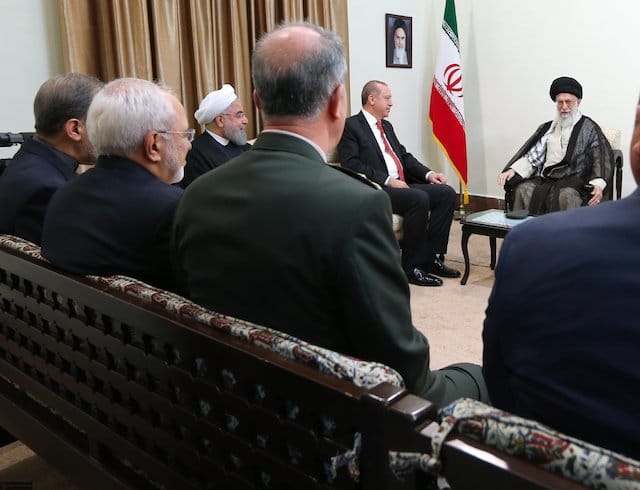Expressing solidarity of opposition to Iraqi Kurdistan’s independence referendum, Iran’s Supreme Leader has told Turkish President Recep Tayyip Erdoğan: “The United States and foreign powers are untrustworthy and seek to create a new Israel in the region.”
Erdoğan met Iranian counterpart Hassan Rouhani and other senior officials on Wednesday, discussing the September 25 referendum — in which almost 93% of Iraqi Kurds supported independence — and the Syrian conflict.
Iran has vehemently denounced any Iraqi Kurdish breakaway from Baghdad, cutting off oil supplies and announcing joint military exercises with Iraq. Turkey has been more moderate in its response, with Erdoğan and Foreign Minister Mevlut Cavusoglu telling Iraqi Kurdish leader Masoud Barzani that “there is a way back” from his “mistake”; however, Erdoğan spoke on Tuesday of sanctions if the move towards independence was not revoked.
Ayatollah Khamenei said to Erdoğan that the Kurdish vote was an “act of betrayal against the region”: “Iran and Turkey should take every possible measure against the move and the Iraqi government, too, should make decisions and take serious action.”
The Supreme Leader invoked “enemies”, claiming that they and Israel were trying to cause disputes among countries in the region.
Rouhani’s Ambitious Goal for Iranian-Turkish Trade
President Rouhani used a series of appearances with Erdoğan to focus on Turkish links for the recovery of Iran’s embattled economy.
Rouhani repeated Iran’s long-stated goal of an annual trade of $30 billion, declaring, “Development of banking relations, doing trade with the national currency, and 24/7 operation of three border crossings between Iran and Turkey were among the decisions made today during intensive talks.”
An Iranian-Turkish agreement on January 1, 2015, set the goal of tripling trade with tariff cuts on about 300 products. However, the amount fell in 2015 to $9.76 billion, compared to $13.7 billion in 2014.
Starting from its first year, the deal led to an awkward outcome: Instead of growing, the trade volume between the two neighbors declined. At the end of 2015, Turkish-Iranian trade stood at $9.76 billion — not only $25 billion short of the target, but also $4 billion below the 2014 figure of $13.7 billion.
Despite the lifting of some sanctions on Tehran with the implementation of the July 2015 nuclear agreement, Iranian-Turkish trade in 2016 fell again by $100 million.
Rouhani also repackaged the Supreme Leader’s opposition to Iraqi Kurdish independence, as well as any de facto partition of Syria: “The two countries considered separatism and intensification of ethnic and religious disagreements in the region as the result of efforts by foreigners, and any change in geographical boundaries will not be acceptable at all.”
Erdoğan told the press conference, “We do not recognise the illegal referendum conducted by the Iraqi Kurdistan Region, and no country has supported the move by Kurdish Region anywhere in the world except Israel.”

